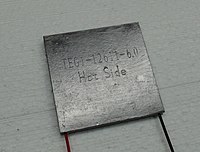
Photo from wikipedia
Densified Ba1−xLaxSnO3 (BLSO) ceramics were synthesized at relatively lower sintering temperature by a conventional solid state reaction route. X-ray diffraction (XRD) analysis using the Reitveld refinement technique inferred cubic (space… Click to show full abstract
Densified Ba1−xLaxSnO3 (BLSO) ceramics were synthesized at relatively lower sintering temperature by a conventional solid state reaction route. X-ray diffraction (XRD) analysis using the Reitveld refinement technique inferred cubic (space group Pm–3m) average crystalline structure. The effect of La-substitution on variations of lattice parameters could be attributed to two competing factors, viz. ionic radii of the dopant and partial reduction of Sn4+ into Sn2+. XRD data indicate local symmetry reduction from cubic to orthorhombic (Pbnm), evident from the observed splitting in {211}p and {310}p peaks of pseudo cubic structure, as well as corresponding super reflections. The synthesized ceramics were highly porous with percentage densification in the range (60–70)% due to the relatively low sintering temperature used. Densification was improved using 2 wt.% Bi2O3 as a sintering aid, which resulted in highly dense ceramics with relative density ≈ 95%. Sintering temperature reduction of ≈ 300°C was also achieved relative to that required in normal solid state synthesis. This is very important to reduce defects and inhibit uneven grain growth. Microstructure and elemental analysis probed through scanning electron microscopy and energy-dispersive x-ray spectroscopy revealed that Bi replaces lanthanum and that liquid phase sintering is mainly responsible for the high densification using the sintering aid. The structural indicators of symmetry reduction were corroborated by experimentally observed Raman modes in an otherwise symmetry-forbidden cubic phase. The local symmetry reduction is attributed mainly to octahedral tilts corresponding to orthorhombic symmetry.
Journal Title: Journal of Electronic Materials
Year Published: 2019
Link to full text (if available)
Share on Social Media: Sign Up to like & get
recommendations!